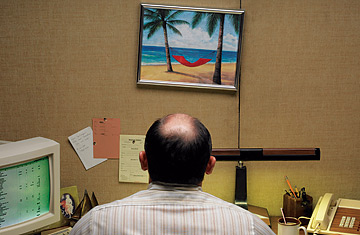
(4 of 4)
Using several different types of brain scans, Pruessner has shown that people who test below average on self-esteem also tend to have smaller-than-average hippocampi. The differences become clear only when you compare groups of people, Pruessner notes, so you can't look at any single person's brain scan and determine whether he or she has low self-esteem. But when you look at overall results, they suggest that a smaller hippocampus simply has more trouble persuading the rest of the brain to turn off the stress response.
Still unclear is how the body goes from having repeated activation of the stress response to showing the typically blunted cortisol levels of someone suffering from burnout. "We are still studying this," says Samuel Melamed of Tel Aviv University in Israel. "But if there is no relief and the cortisol stays up for long periods of time, the body stops responding and readjusts the level."
NO. 6
THERE'S MORE THAN ONE WAY TO RELIEVE STRESS
THIS IS PROBABLY THE TOUGHEST LESSON TO INTERNALIZE BECAUSE when stress overwhelms the system, your choices often seem more limited than they are. Behavioral scientists have a name for this psychological reaction. They call it learned helplessness, and they have studied the phenomenon closely in laboratory rodents, whose nervous system bears striking similarities to that of humans.
Here's how the experiment works: if you provide mice with an escape route, they typically learn very quickly how to avoid a mild electrical shock that occurs a few seconds after they hear a tone. But if the escape route is blocked whenever the tone is sounded, and new shocks occur, the mice will eventually stop trying to run away. Later, even after the escape route is cleared, the animals simply freeze at the sound of the tone--despite the fact that they once knew how to avoid the associated shock.
Obviously, humans have more intellectual resources at their disposal than mice do, but the underlying principle remains. When too many of the rules change, when what used to work doesn't anymore, your ability to reason takes a hit. Just being aware of your nervous system's built-in bias toward learned helplessness in the face of unrelieved stress can help you identify and develop healthy habits that will buffer at least some of the load (see box).
But the one thing you should not do is ignore the risks. Animal research has shown that there is a relatively small window for reversing the physiological effects of chronic stress. Studies of people are starting to produce similar results. Once a person's cortisol level gets completely blunted, it seems to stay that way for years. You owe it to yourself and your loved ones not to let that happen.
